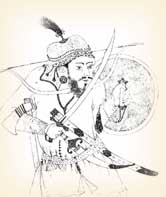 Everyone, it seems, has heard of Marco Polo and his journey to far off
China. But on this day May 7, 1253, the year
before Marco was born, a courageous monk from Flanders left
Constantinople on his own trip to the Far East, visiting the court of
the Great Khan Mangu in the very heart of Mongolia. William of Rubruck's
feat is little known.
Everyone, it seems, has heard of Marco Polo and his journey to far off
China. But on this day May 7, 1253, the year
before Marco was born, a courageous monk from Flanders left
Constantinople on his own trip to the Far East, visiting the court of
the Great Khan Mangu in the very heart of Mongolia. William of Rubruck's
feat is little known.From the start, his efforts were intended to be evangelistic. Louis IX, the saintly king of France, heard that Sartak, Son of Batu, was a Christian. He determined to make contact and encourage these distant brothers in the faith. William, a Franciscan friar, was the man chosen for the job. Accompanied by Bartholomew of Cremona (a fellow friar) and a few other individuals, he left for Sartak's kingdom, hoping to establish a mission there.
Sartak proved to be no Christian. William of Rubruck and his companion suddenly found their mission stretched well beyond initial anticipation. To proceed with their plans, they must first visit Batu, father of Sartak, they were told. And so the two Franciscans traveled up the Volga to Batu's camp. Batu sent them on to Mongolia with two Nestorian priests and a guide. The little party crossed Russia and Mongolia in the depths of winter and arrived in Karakoram in January of 1254.
Other Europeans, captives of war, were already present in the city. Nestorian Christians had long since penetrated the region with the good news of reconciliation with God in Christ. Their ministry had little effect, perhaps because they regularly became drunk on wine rather than on the Holy Spirit.
William met the Khan, discussed theology in his presence, and was allowed to preach. Once he grew vehement and upset the Khan. Nevertheless, William survived for eight months, apparently without serious threat to his person. He baptized sixty Christians.
In August, William left Tatary, bearing a letter from Mangu, demanding submission of all Western kings and the Pope. God had appointed him master of the world, claimed the Khan, and not even mighty seas and high mountains would prevent him from conquering the West.
William of Rubruck arrived at Acre in May 1255, bearing this grandiose proclamation. He forwarded it to King Louis with a careful and accurate report. It included the best descriptions of Asia which had reached Europe to that point. In its pages were suggestions for further mission work. This did not materialize. Altogether, Rubruck's missionary journey covered 11,000 miles, much of it through dangerous territory.
Bibliography:
- Abbott, Jacob. History of Genghis Khan. New York: Harpers, 1899. Source of the image.
- Neill, Stephen. A History of Christian Missions. The Pelican History of the Church #6. Hammondsworth, Middlesex, England: Pelican Books, 1964, pp. 122ff.
- Olschki, Leonardo. Marco Polo's Precursors. Baltimore, Johns Hopkins Press, 1943.
- Schlager, Patricius. "Rubruck, William." The Catholic Encyclopedia. New York: Robert Appleton, 1914.
- "William of Rubruck." Explorers and Discoverers of the World. Edited by Daniel B. Baker. Detroit: Gale Research, 1993.